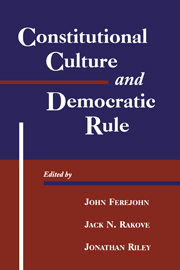Book contents
- Frontmatter
- Contents
- List of Contributors
- Editors' Introduction
- PART ONE CONSTITUTIONAL BEGINNINGS AND TRANSITIONS
- PART TWO CONSTITUTIONAL STRUCTURE AND DESIGN
- PART THREE CONSTITUTIONAL CHANGE AND STABILITY
- 8 Designing an Amendment Process
- 9 Constitutional Theory Transformed
- 10 Constitutional Economic Transition
- 11 Institutionalizing Constitutional Interpretation
- Name Index
- Subject Index
9 - Constitutional Theory Transformed
Published online by Cambridge University Press: 20 March 2010
- Frontmatter
- Contents
- List of Contributors
- Editors' Introduction
- PART ONE CONSTITUTIONAL BEGINNINGS AND TRANSITIONS
- PART TWO CONSTITUTIONAL STRUCTURE AND DESIGN
- PART THREE CONSTITUTIONAL CHANGE AND STABILITY
- 8 Designing an Amendment Process
- 9 Constitutional Theory Transformed
- 10 Constitutional Economic Transition
- 11 Institutionalizing Constitutional Interpretation
- Name Index
- Subject Index
Summary
Theories of constitutional change try to see the U.S. Constitution whole. They attempt to understand how all three branches of government have contributed to the course of constitutional development in the United States. Among recent theorists of constitutional change, Bruce Ackerman deserves great credit for highlighting the importance of this issue and stressing the need to consider the relationships among all the branches of government during three great constitutional moments: Founding, Reconstruction, and the New Deal (1991; 1998).
Whereas Ackerman is primarily interested in exploring the implications of constitutional change for constitutional law, I am interested in what this means for constitutional theory (Griffin 1996). Using the New Deal as my focus, I argue in this chapter that the new concern with constitutional change has the potential to transform American constitutional theory. In particular, I wish to press two related ideas: that because theories of constitutional change are historicist, they are not necessarily interpretive. Indeed, there is an important sense in which theories of constitutional change are prior to theories of constitutional interpretation.
This perspective on constitutional change is inspired in part by the methodology of “historical institutionalism” in political science. Historical institutionalism is often called a “state-centered” approach because it takes the concept of the state seriously and focuses on its halting evolution through American history. Perhaps the most important contribution of historical institutionalism has been its emphasis on the autonomy of the state.
- Type
- Chapter
- Information
- Constitutional Culture and Democratic Rule , pp. 288 - 327Publisher: Cambridge University PressPrint publication year: 2001



